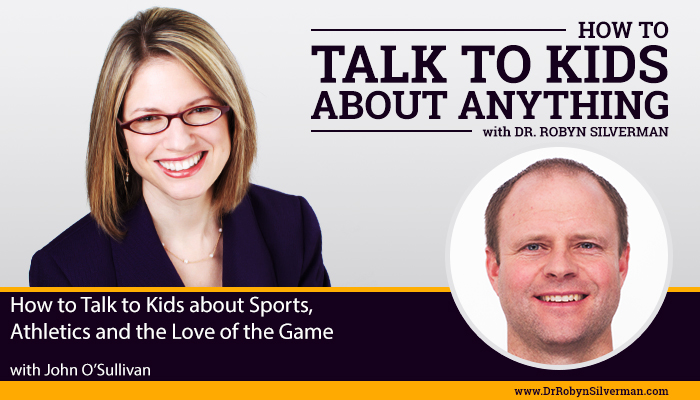Podcast: Play in new window | Download
Subscribe: Apple Podcasts | RSS | More
How to Talk to Kids about Sports, Athletics and the Love of the Game
This podcast will focus on youth sports and how it is different from professional sports and adult athletics. How can we inspire kids to want to play? We need to ensure that it’s fun, they have ownership over their experience and they have intrinsic motivation to do the activity. John O’Sullivan talks with us about how we can take back the fun of sports for kids, leave behind the yelling, inappropriate expectations and living vicariously through our kids. We want more kids in sports because it’s great for their mental and physical health. Let’s chat about how we can make this happen.
Why do children play sports? According to a study by researchers at Notre Dame’s Center for Ethical Education, it’s to (#1) have fun, 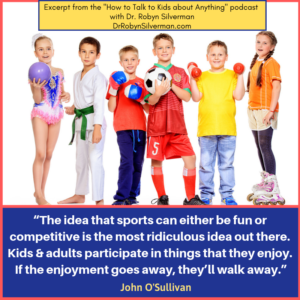 then—do something that are good at, improve skills, get exercise, be part of a team and enjoy the excitement of competition. But looking out at many sports fields or at many athletic events- sometimes, if we are being truthful, it looks like we are missing the mark. There are coaches screaming and parents gritting their teeth, fans yelling at referees and teammates shunning other teammates over missed goals or botched moves. What happened to the carefree freedom and fun that sports and athletic engagement once gave us? It’s no wonder so many kids drop out of sports by the age of 13. And if we are really to ask ourselves how we can develop strong athletes who thrive at peak performance- do we really think this is the way? My next guest has some other ideas that can really help us.
then—do something that are good at, improve skills, get exercise, be part of a team and enjoy the excitement of competition. But looking out at many sports fields or at many athletic events- sometimes, if we are being truthful, it looks like we are missing the mark. There are coaches screaming and parents gritting their teeth, fans yelling at referees and teammates shunning other teammates over missed goals or botched moves. What happened to the carefree freedom and fun that sports and athletic engagement once gave us? It’s no wonder so many kids drop out of sports by the age of 13. And if we are really to ask ourselves how we can develop strong athletes who thrive at peak performance- do we really think this is the way? My next guest has some other ideas that can really help us.
John O’Sullivan started the Changing the Game Project in 2012 after two decades as a soccer player- collegiate and professional- and a coach on the youth, high school, college and professional level. He is the author of the #1 bestselling books Changing the Game: The Parents Guide to Raising Happy, High Performing Athletes, Giving Youth Sports Back to our Kids and Is it Wise to Specialize? John’s work has been featured in The Huffington Post, CNN.com, Outside Magazine, ESPN.com, Soccer America and numerous other publications. John is an internationally known speaker for coaches, parents and youth sports organizations, and has spoken for TEDx, the National Soccer Coaches Association of America, US Lacrosse, IMG Academy, and at numerous other events throughout the US, Canada, Asia and Europe. He has a popular podcast for coaches called Way of the Champions and has even consulted with the US Olympic Committee.
The podcast provides:
- The positive mindset needed in sports
- How to focus on character over winning
- Why children quit sports and what to do about it
- The 7cs of a high-performance state of mind and how it impacts sports
- Key factors related to Long Term Athletic Development
- How to communicate with children about sports
- What coaches and parents need to know when screaming at their athletes
Important Messages:
- Sports should be fun and provide enjoyment even if it’s competitive.
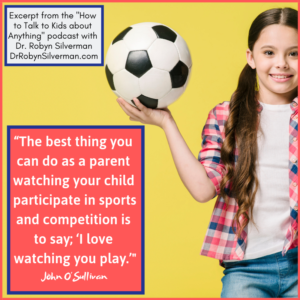
- About ¾ of children are done with sports by middle school. At the same time that kids have walked away from sports, schools are cutting PE and recess. This is a problem. Sports keeps kids moving.
- Toxic coaching: Doesn’t focus on the needs of the athletes during the game.
- Toxic sidelines: Parents yelling at referees and coaches and athletes and only thinking about today and not the long term development in the sport. Coaching from the sidelines- not letting them make the decisions for themselves.
- Advertisements- for example, the AAU is running a national basketball competition for 7 year olds. No benefit. That’s about exploitation.
- We want to change it to healthy competition- fewer barriers to the sport- less time commitment, financial restrictions, life balance, no specialization before it’s scientifically healthy to do, inclusiveness in sport. Sport development should match the science of developing healthy athletes for the long term.
- Stop using professional sport as a model for youth sport.
- It’s important for kids to know that the snippets that they see on ESPN are only small nuggets of scenes that these athletes spend with their teams and coaches- bonding, learning, growing- there is a respect for each other so that when a coach raises his voice in a game it’s out of love not fear.
- When sports is for entertainment and it’s all about winning, what happens? You cut corners. That’s how you wind up with what happened with USAG, doping, cheating. This is not what youth sports should be about (registering older children for younger teams to get an edge).
- Joe Irmin: There’s a big myth that sports develops character. There are two different kinds of character. There’s performance character and moral character. Sports, to an extent, can develop performance character like grit and resilience (you’ve done 8 pull-ups and you are trying to do 10 and you push yourself to get to 9). When we look at moral character- integrity, respect- that doesn’t happen by accident because you signed up for soccer. Sports organizations and coaches have to intentionally teach it. And kids have to see it.
- Many people in C level jobs have a sporting background. It’s about working with people and dealing with differences- working towards a common goal- whether winning a championship or trying to run a company.
- Kids quit when the sport is no longer fun. Or they lose ownership of the experience (people living vicariously through them).
- If they are practicing the sport outside of practice, then it indicates an enjoyment and possible commitment.
- Script: “You made a commitment, and you need to fulfill your commitment.”
- Tim Elmore: On a scale from a one to ten on really not liking to play at all and wanting to play all the time, where are you? If they are a 3- why aren’t they a 2? What would make them a 6?
- Do your kids want to quit because of a fixable problem or do they want to quit because they have found a new interest that they prefer to explore?
- If your kids are in a toxic environment in sports- take them out.
- Study out of Europe: If parents have unfulfilled dreams, they are more likely to want to live vicariously through their children.
- Cs: Common sense, control, competence, confidence, conditions, communication, caring. Look in these areas to see how you can help. Your kids connect or reconnect with sports.
- Is the car ride home very unpleasant? You can change this. This is NOT the time for a teachable moment.
- In the car: take into account their state of mind in that moment. If they won, let them feel good for a while! If they lost, they already feel lousy- don’t lean in. Let your kids guide the conversation.
- Would you like me to answer as your parent or your coach?
- The post game talk- what do you have to say when you are angry or upset or disappointed that you can’t say at the hotel later than night or before the next practice? At that point, words can be like vomit- they make you feel better but everyone else feel worse.
- Address bullying behavior right away.
- LTAD- came out of Canada. Long Term Athletic Development. Physical Literacy.
- Some kids might have a genetic advantage BUT many kids who do really well in athletics are simply older.
- At young ages, children develop movement skills quicker than they’ll be able to do aerobic fitness- so a four-mile run isn’t appropriate but speed and agility drills would be appropriate. After puberty is a different story. Young children shouldn’t be doing laps.
- Need adjust drills for young people to teach them complicated fundamentals. How can we translate fundamentals for kids in a fun way? Why would a kid like to play an adult game?
- What to say to a child in a family meeting: Depends on ages and stages. Three goals- Have fun, try your best and fulfill your commitment. As they get into middle school, it can be around their goals too. If we are going to commit the finances and resources and driving to this elevated commitment, then the child needs to recognize their increased level of commitment. Otherwise, make a lesser commitment (i.e. not travel, recreational). Practice expectations. “You want to play at this advanced level but your commitment level is only at the recreational level therefore…we can’t keep paying $3000 dollars when $85 will do.”
- If an adult (coach/parent) was screaming at a child while in a sport, what would you want to whisper to that person? “Would this be helpful at work for you?”
- Sports- difficult motor actions in a public place.
- Three critical ingredients for your child to stay in a sport long enough for them to get good at it: (1) Enjoyment (2) Ownership (3) Intrinsic motivation. Ask yourself: Are they loving what they’re doing? Do they have ownership- are they here for themselves? Do they seem motivated to get better and do more? Check in on these things.
- Things to say to your child in sports/competition: “I love watching you play.” “I am proud of the fact that you are out there even if it wasn’t your best day.” “I love playing _______ with you, I love doing _______ with you and I love watching you play _________.” You want to be there for the right reasons- and you want your children to know you are there for the right reasons. You want your kid to want you to attend their competitions.
Notable Quotables:
-
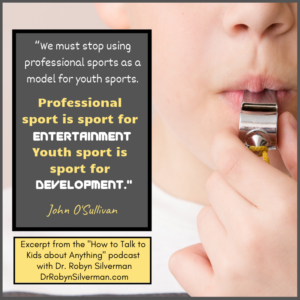 “The idea that sports can either be fun or competitive is the most ridiculous idea out there. Kids and adults will participate in things that they enjoy and if the enjoyment factor goes away, they’ll walk away.”
“The idea that sports can either be fun or competitive is the most ridiculous idea out there. Kids and adults will participate in things that they enjoy and if the enjoyment factor goes away, they’ll walk away.” - “The competition for soccer isn’t lacrosse. It’s fortnite. It’s social media. Sports has to outperforms these companies that spend tens of millions of dollars each year that asks how can we make this better so kids will do it more? Then they implement it. It we put joy and fun at the center of everything we do sportswise, then we get closer to creating the environment that makes them want to come back.”
- “When we say sports should be fun or enjoyable doesn’t mean that they can’t be competitive or demanding—those are words that kids use to describe things that make it fun!
- “About ¾ of children are done with sports by middle school. At the same time that kids have walked away from sports, schools are cutting PE and recess in spite of all the evidence that shows how important movement is to not only learning but lifelong positive health outcomes. Sport is an opportunity to keep kids moving and train them correctly so that they become active for life.”
- “Sport development of our athletes should match the science and psychology and sociology of best principles of developing healthy athletes for the long term. Most of what we do now goes directly against what gives athletes the best chance of performing over the long term.”
- “We must stop using professional sports as a model for youth sports. Professional sport is sport for entertainment. Youth sport is sport for development.”
- “We don’t use college as a model for what a kindergarten class should look like. We shouldn’t be using professional sports as a model for what youth sports should look like.”
- “When we look at the development of moral character like integrity and respect- that kind of character development doesn’t happen by accident because you happened to sign up for soccer. Sports organizations and coaches have to intentionally teach it.”
- “If we want to teach character through sport, then we have to intentionally teach it everyday.”
- “Many people in C-Level jobs have a sporting background. It’s about the ability to recognize each others’ differences and work together towards a common goal whether that’s trying to win a championship or run a company. People are people whether they are chasing a ball or chasing sales figures.
- The fact is, no matter how good a coach you are, only a tiny percentage of your athletes will ever make a living from the sport that you are teaching BUT EVERYONE will have the opportunity to use the things you teach them in some aspect of their life. So if the only think you are teaching them is how to hit a curve ball, you are really selling your kids short.”
- “If the number one reason that kids play sports is enjoyment then the number one reason kids quit sports is because they don’t enjoy it anymore.”
- “The single most important factor that affects sports performance is the environment and the state of mind of the participant.
- “My job as your parent is to make you feel better. My job as your coach is to make you be better.”
- “We would never have a 5-year-old who struggled with reading and just say; ‘well, she’s just not a reader. Let’s move on.’ But we have 5 year olds who struggle with fundamental movement- how to run, throw, skip, jump, catch and we say; “well, he’s just not an athlete. Let’s move on.’ These are learned skills.”
- “Sports for kids need to fit the needs of the child not the needs of the teacher.”
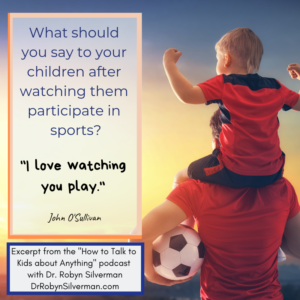
- “We don’t go into math class and yell at a child to carry the one. We don’t go to a music concert and shout ‘the woodwinds are killing us tonight!’ Why do we think it would be helpful for a child to be berated and yelled at while in the middle of doing a sport?”
- “Sports is really one of the only places where parents get to see their child succeed and fail first hand. We want to intervene out of love not to mess them up.”
- “The best thing you can do as a parent watching your child participate in sports and competition is to say; ‘I love watching you play.’”

